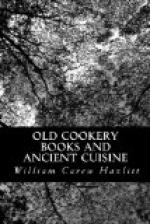In Archbishop Alfric’s “Colloquy,” originally written in the tenth century, and subsequently augmented and enriched with a Saxon gloss by one of his pupils, the cook is one of the persons introduced and interrogated. He is asked what his profession is worth to the community; and he replies that without him people would have to eat their greens and flesh raw; whereupon it is rejoined that they might readily dress them themselves; to which the cook can only answer, that in such case all men would be reduced to the position of servants.
The kitchen had its chef or master-cook (archimacherus), under-cooks, a waferer or maker of sweets, a scullion or swiller (who is otherwise described as a quistron), and knaves, or boys for preparing the meat; and all these had their special functions and implements.
Even in the fifteenth century the appliances for cookery were evidently far more numerous than they had been. An illustrated vocabulary portrays, among other items, the dressing-board, the dressing-knife, the roasting-iron, the frying-pan, the spit-turner (in lieu of the old turn-broach), the andiron, the ladle, the slice, the skummer; and the assitabulum, or saucer, first presents itself. It seems as if the butler and the pantler had their own separate quarters; and the different species of wine, and the vessels for holding it, are not forgotten. The archaic pantry was dedicated, not to its later objects, but to that which the name strictly signifies; but at the same time the writer warrants us in concluding, that the pantry accommodated certain miscellaneous utensils, as he comprises in its contents a candlestick, a table or board-cloth, a hand-cloth or napkin, a drinking bowl, a saucer, and a spoon. The kitchen, in short, comprised within its boundaries a far larger variety of domestic requisites of all kinds than its modern representative, which deals with an external machinery so totally changed. The ancient Court of England was so differently constituted from the present, and so many offices which sprang out of the feudal system have fallen into desuetude, that it requires a considerable effort to imagine a condition of things, where the master-cook of our lord the king was a personage of high rank and extended possessions. How early




